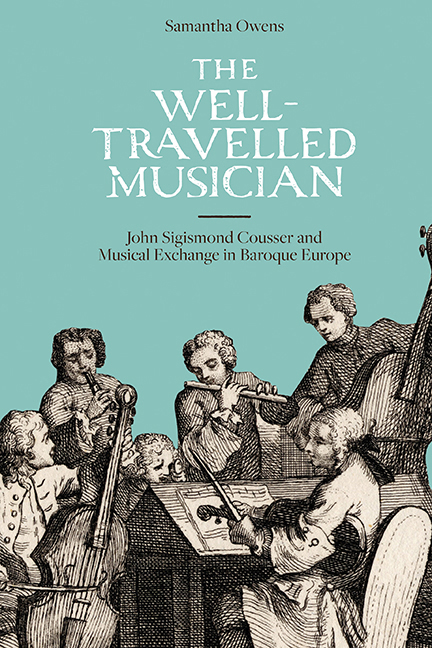Book contents
- Frontmatter
- Dedcation
- Contents
- List of Tables
- Preface
- Abbreviations
- Notes on Sources
- Introduction: John Sigismond Cousser and his ‘Commonplace Book’
- 1 Hungarian Beginnings and the Adoption of French Musical Style
- 2 Kapellmeister at the Wolfenbüttel Court and Braunschweig Opera House
- 3 Ariadne to Porus: Cousser's Braunschweig Operas
- 4 ‘The Incomparable Director’ in Hamburg, Nuremberg and Augsburg
- 5 Heliconische Musen-Lust: Opera at the Württemberg Court
- 6 ‘Il Paradiso terrestre’? Cousser in London
- 7 ‘Fortune not Blind’: Music for Dublin Castle
- 8 ‘Our Concert’: A Musician at Home
- 9 Cousser's ‘collection of fine musick’ and the Practicalities of Musical Exchange
- Appendix 1 Summary of the Contents of Cousser's ‘Commonplace Book’
- Appendix 2 Cousser's Address Book
- Appendix 3 Cousser's Books of Cantatas, Madrigals, Duets and Serenatas
- Appendix 4 Cousser's Inventory of Ouverture Incipits
- Appendix 5 Transcription of Cousser's Notes for his 1716 Trip to London and the Continent
- Bibliography
- Index
- Titles listed here were originally published under the series title Music in Britain, 1600–1900
- New titles published under the series title Music in Britain, 1600–2000
3 - Ariadne to Porus: Cousser's Braunschweig Operas
Published online by Cambridge University Press: 30 August 2019
- Frontmatter
- Dedcation
- Contents
- List of Tables
- Preface
- Abbreviations
- Notes on Sources
- Introduction: John Sigismond Cousser and his ‘Commonplace Book’
- 1 Hungarian Beginnings and the Adoption of French Musical Style
- 2 Kapellmeister at the Wolfenbüttel Court and Braunschweig Opera House
- 3 Ariadne to Porus: Cousser's Braunschweig Operas
- 4 ‘The Incomparable Director’ in Hamburg, Nuremberg and Augsburg
- 5 Heliconische Musen-Lust: Opera at the Württemberg Court
- 6 ‘Il Paradiso terrestre’? Cousser in London
- 7 ‘Fortune not Blind’: Music for Dublin Castle
- 8 ‘Our Concert’: A Musician at Home
- 9 Cousser's ‘collection of fine musick’ and the Practicalities of Musical Exchange
- Appendix 1 Summary of the Contents of Cousser's ‘Commonplace Book’
- Appendix 2 Cousser's Address Book
- Appendix 3 Cousser's Books of Cantatas, Madrigals, Duets and Serenatas
- Appendix 4 Cousser's Inventory of Ouverture Incipits
- Appendix 5 Transcription of Cousser's Notes for his 1716 Trip to London and the Continent
- Bibliography
- Index
- Titles listed here were originally published under the series title Music in Britain, 1600–1900
- New titles published under the series title Music in Britain, 1600–2000
Summary
❧ ‘A better market crier than an opera librettist’: Cousser's Ariadne
IN complete contrast to the scheduling of works for the Braunschweig opera house in 1691 – during which four Italian drammi per musica and only one German-language work, a repeat of Cousser's Cleopatra, were performed – 1692 saw the tables turned. Strikingly, three operas by Cousser received their premiere performances at the theatre: Ariadne, Andromeda and Jason, while a fourth, Narcissus, Cousser's setting of a libretto by Gottlieb Fiedler (Fidler), was performed in October at an unknown venue (probably the Wolfenbüttel court theatre). While the catalyst for this change is now unknown, the decision no doubt resulted a range of motives, both cultural and commercial. As well as fulfilling Anton Ulrich's long-term desire to support German language and literature as a leading member of the Fruchtbringende Gesellschaft, Germanlanguage works were perhaps thought to attract larger audiences. Whatever the case, through the composition and production of these four works Cousser played his part in the development of German-language opera in the Holy Roman Empire, although the lack of extant music makes his contribution difficult to assess. For while a selection of music has survived for Ariadne, the nature of the three other operas (Andromeda, Jason and Porus) must be pieced together from librettos, set designs and financial records.
It may also be possible that Cousser's increased compositional output in 1692 was aided by a happy change in his personal circumstances. By 1691, Cousser was in his early thirties, and his stable position at the Wolfenbüttel court had enabled him to marry. At Braunschweig's cathedral on 26 August, he wed Hedwig Melusine von Damm (1668–1749), the youngest daughter of a local Burger, Jürgen von Damm (1639–70), and his wife Anna Sophia (née Schomerus; 1643–91). The couple's first child, Augusta Elisabetha (Lieschen), was born on 1 June 1692 and baptized in their Wolfenbüttel home several days later. The following year a second daughter arrived, Charlotta Margareta (1693–1769), born on 27 December and baptized three days later, again in the family's residence.
Yet not everything was running smoothly, for in September 1691, less than a month after Cousser's marriage, difficulties caused by Bressand's administration of the Braunschweig opera house led to Anton Ulrich's failed attempt to employ Gerhard Schott as the theatre's new manager.
- Type
- Chapter
- Information
- The Well-Travelled MusicianJohn Sigismond Cousser and Musical Exchange in Baroque Europe, pp. 46 - 64Publisher: Boydell & BrewerPrint publication year: 2017

